出国旅游实用英语
出国旅游英语900句

出国旅游英语(通用)一、旅行准备1.I want to book a roundtrip ticket from New York to London. 我想预定一张从纽约到伦敦的往返机票。
2.How much does it cost to fly to Paris roundtrip? 飞往巴黎的往返机票多少钱?3.Do you have any discount for students? 你们对学生有优惠吗?4.I need to check in for my flight to Los Angeles. 我需要办理飞往洛杉矶的登机手续。
5.Do you have any luggage to check in? 你有行李需要托运吗?6.What time does the flight take off? 飞机什么时候起飞?7.How long will the flight take? 飞行时间有多长?8.What is the status of my flight? 我的航班状态怎么样?9.Can I change my seat? 我可以换座位吗?10.D o you have any duty-free items? 你有免税商品吗?二、旅行途中1.Excuse me, where is the restroom? 请问洗手间在哪里?2.Could you tell me how to fasten the seat belt? 你能告诉我如何系安全带吗?3.I feel a little bit nervous. 我感觉有点紧张。
4.Can I get some pillow and blanket? 可以给我枕头和毛毯吗?5.Would you mind lowering the back of the seat? 你介意把椅背放低一点吗?6.Can I get some coffee? 可以给我一杯咖啡吗?7.What kind of food do you have on this flight? 这架飞机上供应什么样的食物?8.Would you like to order some meals? 您要点餐吗?9.Can I use my mobile phone during the flight? 在飞行过程中我可以使用手机吗?10.D o you have any in-flight entertainment? 这架飞机上有娱乐设施吗?三、出行交通1.How can I get to the subway station? 请问怎么去地铁站?2.Is there a bus to the city center? 有公交车到市中心吗?3.How much is the fare to the train station? 到火车站的车费是多少?4.Can I share a taxi with someone? 我可以和其他人共乘一辆出租车吗?5.How long does the ride take? 乘车需要多长时间?6.Do you need to stop anywhere on the way? 路上需要停靠在什么地方吗?7.Can I walk to the destination? 我可以步行到目的地吗?8.Is there a pedestrian-only zone nearby? 附近有步行街区吗?9.Can you tell me how to get to the nearest subway station? 你能告诉我如何去最近的地铁站吗?10.D o you have any information about public transportation? 你有什么关于公共交通的信息吗?四、住宿问题1.Do you have a reservation? 您有预订吗?2.I want a room with a double bed. 我想要一个双床房。
出国旅游常用实用英语口语大全
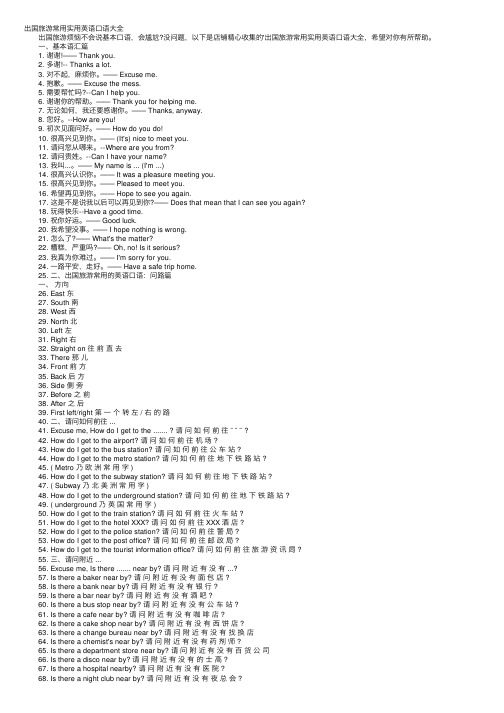
出国旅游常⽤实⽤英语⼝语⼤全 出国旅游烦恼不会说基本⼝语,会尴尬?没问题,以下是店铺精⼼收集的'出国旅游常⽤实⽤英语⼝语⼤全,希望对你有所帮助。
⼀、基本语汇篇 1. 谢谢!—— Thank you. 2. 多谢!-- Thanks a lot. 3. 对不起,⿇烦你。
—— Excuse me. 4. 抱歉。
—— Excuse the mess. 5. 需要帮忙吗?--Can I help you. 6. 谢谢你的帮助。
—— Thank you for helping me. 7. ⽆论如何,我还要感谢你。
—— Thanks, anyway. 8. 您好。
--How are you! 9. 初次见⾯问好。
—— How do you do! 10. 很⾼兴见到你。
—— (It's) nice to meet you. 11. 请问您从哪来。
--Where are you from? 12. 请问贵姓。
--Can I have your name? 13. 我叫...。
—— My name is ... (I'm ...) 14. 很⾼兴认识你。
—— It was a pleasure meeting you. 15. 很⾼兴见到你。
—— Pleased to meet you. 16. 希望再见到你。
—— Hope to see you again. 17. 这是不是说我以后可以再见到你?—— Does that mean that I can see you again? 18. 玩得快乐--Have a good time. 19. 祝你好运。
—— Good luck. 20. 我希望没事。
—— I hope nothing is wrong. 21. 怎么了?—— What's the matter? 22. 糟糕,严重吗?—— Oh, no! Is it serious? 23. 我真为你难过。
出国旅游实用英语口语总结
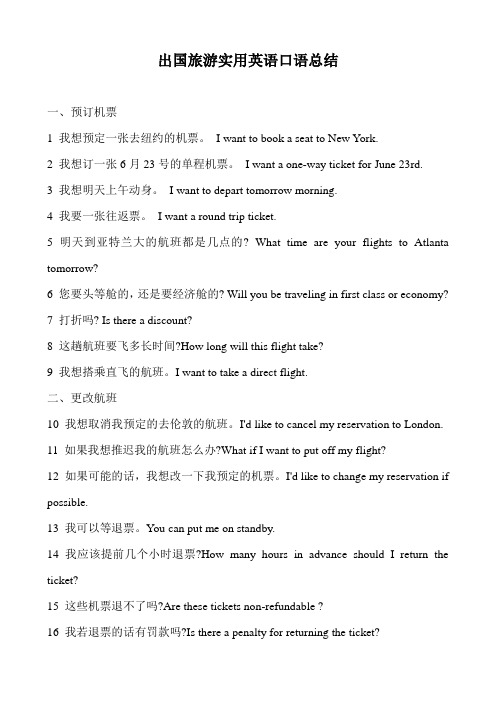
出国旅游实用英语口语总结一、预订机票1 我想预定一张去纽约的机票。
I want to book a seat to New York.2 我想订一张6月23号的单程机票。
I want a one-way ticket for June 23rd.3 我想明天上午动身。
I want to depart tomorrow morning.4 我要一张往返票。
I want a round trip ticket.5 明天到亚特兰大的航班都是几点的? What time are your flights to Atlanta tomorrow?6 您要头等舱的,还是要经济舱的? Will you be traveling in first class or economy?7 打折吗? Is there a discount?8 这趟航班要飞多长时间?How long will this flight take?9 我想搭乘直飞的航班。
I want to take a direct flight.二、更改航班10 我想取消我预定的去伦敦的航班。
I'd like to cancel my reservation to London.11 如果我想推迟我的航班怎么办?What if I want to put off my flight?12 如果可能的话,我想改一下我预定的机票。
I'd like to change my reservation if possible.13 我可以等退票。
You can put me on standby.14 我应该提前几个小时退票?How many hours in advance should I return the ticket?15 这些机票退不了吗?Are these tickets non-refundable ?16 我若退票的话有罚款吗?Is there a penalty for returning the ticket?17 我刚刚错过了航班,需要重新确定时间。
出国旅游英语口语
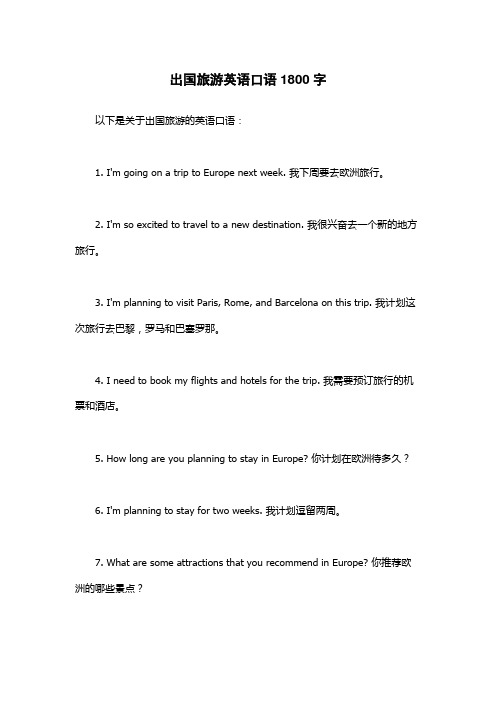
出国旅游英语口语1800字以下是关于出国旅游的英语口语:1. I'm going on a trip to Europe next week. 我下周要去欧洲旅行。
2. I'm so excited to travel to a new destination. 我很兴奋去一个新的地方旅行。
3. I'm planning to visit Paris, Rome, and Barcelona on this trip. 我计划这次旅行去巴黎,罗马和巴塞罗那。
4. I need to book my flights and hotels for the trip. 我需要预订旅行的机票和酒店。
5. How long are you planning to stay in Europe? 你计划在欧洲待多久?6. I'm planning to stay for two weeks. 我计划逗留两周。
7. What are some attractions that you recommend in Europe? 你推荐欧洲的哪些景点?8. I recommend visiting the Eiffel Tower in Paris, the Colosseum in Rome, and the La Sagrada Familia in Barcelona. 我推荐在巴黎参观埃菲尔铁塔,在罗马参观斗兽场,以及在巴塞罗那参观圣家族大教堂。
9. Have you applied for a tourist visa to Europe? 你申请了欧洲旅游签证吗?10. Yes, I have applied for a tourist visa and it was approved. 是的,我已经申请了旅游签证,并且已经批准了。
11. I'm looking for a tour guide to show me around Europe. 我正在寻找一位导游带我游览欧洲。
出国旅游英语急用话题71个

出国旅游英语急用话题71个Traveling abroad can be an exciting and enriching experience, but it can also be daunting for those who are not fluent in the local language. To help you navigate your international adventures, here are 71 essential English phrases you might find useful during your travels.Greetings and Introductions1. "Hello, my name is [your name]."2. "Nice to meet you."3. "How are you?"4. "I'm doing well, thank you."5. "Pleased to make your acquaintance."At the Airport6. "Where is the check-in counter for [airline name]?"7. "I need to check in for my flight."8. "I have a reservation under the name [your name]."9. "I'd like to check my bag(s)."10. "Where is the security checkpoint?"11. "Can you please direct me to my gate?"12. "Excuse me, my flight is boarding. Which way to the gate?"Asking for Directions13. "Excuse me, could you tell me how to get to [destination]?"14. "Is it far from here?"15. "Which way should I go?"16. "Can you point me in the right direction?"17. "Is it on the left or right side?"18. "Is it close by or a long way?"19. "How long will it take me to get there?"20. "I'm sorry, I'm a bit lost. Can you help me?"At the Hotel21. "I have a reservation under the name [your name]."22. "I'd like to check in, please."23. "What time is check-out?"24. "Can I get a room with a [specific request, e.g., view, balcony]?"25. "I need to extend my stay. How do I do that?"26. "Where is the elevator/stairs?"27. "Can you recommend a good restaurant nearby?"28. "I seem to have misplaced my room key. Can I get a replacement?"Dining and Ordering Food29. "I'd like to make a reservation for [number] people at [time]."30. "I have a food allergy/dietary restriction. What do yourecommend?"31. "Can I see the menu, please?"32. "I'll have the [dish name], please."33. "May I get the bill, please?"34. "Can I get the check, please?"35. "Do you accept credit cards?"36. "Can I get a refill on my [beverage]?"37. "The food was delicious, thank you."Shopping and Purchases38. "How much is this [item]?"39. "Do you have this in a different size/color?"40. "I'd like to buy this [item], please."41. "Can I pay with a credit card?"42. "Do you offer a discount for [students/seniors/etc.]?"43. "Can you gift wrap this for me?"44. "Where is the nearest ATM?"45. "I need to exchange some currency. Where can I do that?"Emergencies and Assistance46. "I need help. Can you call the police/ambulance/fire department?"47. "I've lost my [item, e.g., wallet, passport, phone]."48. "I've been the victim of a crime. How do I report it?"49. "I need to contact my embassy/consulate. Where is it located?"50. "Can you recommend a doctor/hospital?"51. "I don't feel well. What should I do?"Cultural Awareness and Etiquette52. "Excuse me, is it okay if I take a photo here?"53. "I'm sorry, I don't understand. Could you please speak more slowly?"54. "Thank you, this is very kind of you."55. "Pardon me, is it acceptable to [specific action, e.g., remove shoes, tip]?"56. "I'm sorry, I don't speak [local language]. Do you speak English?"Travel Logistics57. "When is the next [mode of transportation, e.g., bus, train, flight] to [destination]?"58. "How much is the fare for a [single/round-trip] ticket?"59. "Can I buy a ticket online, or do I need to purchase it at the station/airport?"60. "Where is the [mode of transportation] station/terminal?"61. "Is there a direct route, or do I need to transfer?"62. "How long will the journey take?"63. "Are there any delays or cancellations I should be aware of?"64. "Can you help me with my luggage?"General Assistance65. "Excuse me, can you help me?"66. "I'm looking for [specific place or item]. Do you know where I can find it?"67. "Can you recommend a good [attraction, restaurant, shop]?"68. "What are the local customs or traditions I should be aware of?"69. "Is it safe to [specific activity] in this area?"70. "Can you suggest some must-see sights or activities in the city?"71. "Thank you for your help. I appreciate it."Remember, learning a few key phrases in the local language can also go a long way in making your travels more enjoyable and respectful of the local culture. With these 71 essential English phrases, you'll be well-equipped to navigate your international adventures with confidence and ease.。
出国旅游实用简易英语
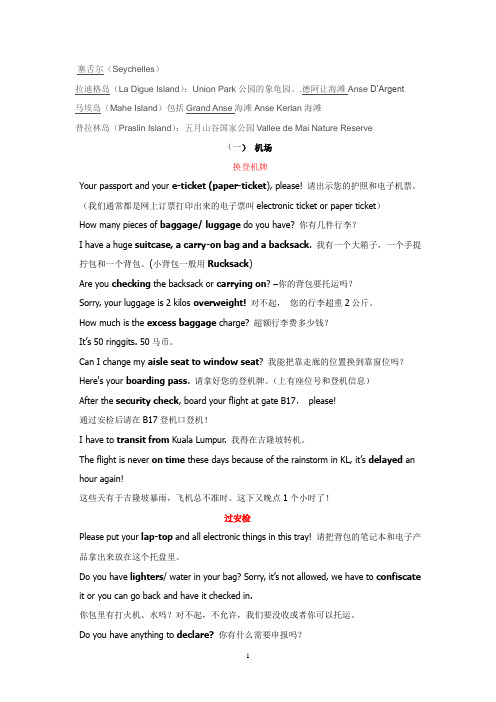
塞舌尔(Seychelles)拉迪格岛(La Digue Island):Union Park公园的象龟园、.德阿让海滩Anse D’Argent马埃岛(Mahe Island)包括Grand Anse海滩Anse Kerlan海滩普拉林岛(Praslin Island):五月山谷国家公园Vallee de Mai Nature Reserve(一)机场换登机牌Your passport and your e-ticket (paper-ticket), please! 请出示您的护照和电子机票。
(我们通常都是网上订票打印出来的电子票叫electronic ticket or paper ticket)How many pieces of baggage/ luggage do you have? 你有几件行李?I have a huge suitcase, a carry-on bag and a backsack. 我有一个大箱子,一个手提拧包和一个背包。
(小背包一般用Rucksack)Are you checking the backsack or carrying on? –你的背包要托运吗?Sorry, your luggage is 2 kilos overweight!对不起,您的行李超重2公斤。
How much is the excess baggage charge? 超额行李费多少钱?It’s 50 rin ggits. 50马币。
Can I change my aisle seat to window seat? 我能把靠走廊的位置换到靠窗位吗?Here's your boarding pass. 请拿好您的登机牌。
(上有座位号和登机信息)After the security check, board your flight at gate B17,please!通过安检后请在B17登机口登机!I have to transit from Kuala Lumpur. 我得在吉隆坡转机。
实用出国旅游常用英语口语大全
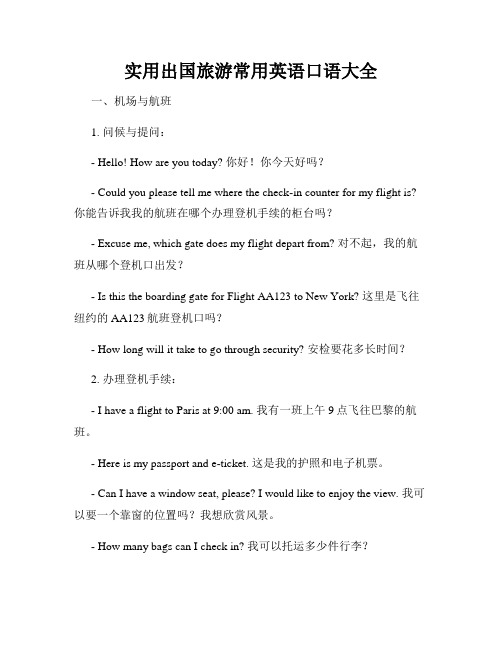
实用出国旅游常用英语口语大全一、机场与航班1. 问候与提问:- Hello! How are you today? 你好!你今天好吗?- Could you please tell me where the check-in counter for my flight is? 你能告诉我我的航班在哪个办理登机手续的柜台吗?- Excuse me, which gate does my flight depart from? 对不起,我的航班从哪个登机口出发?- Is this the boarding gate for Flight AA123 to New York? 这里是飞往纽约的AA123航班登机口吗?- How long will it take to go through security? 安检要花多长时间?2. 办理登机手续:- I have a flight to Paris at 9:00 am. 我有一班上午9点飞往巴黎的航班。
- Here is my passport and e-ticket. 这是我的护照和电子机票。
- Can I have a window seat, please? I would like to enjoy the view. 我可以要一个靠窗的位置吗?我想欣赏风景。
- How many bags can I check in? 我可以托运多少件行李?- This bag contains fragile items. Can you please handle it with care? 这个包裹里有易碎物品,请小心处理。
- Do I need to pay any extra fees for excess baggage? 我需要为超重行李支付额外费用吗?3. 登机和航班延误:- This is the final call for passengers boarding Flight AA123 to London. 这是登上AA123飞往伦敦的最后通知。
出国旅游英语口语900句
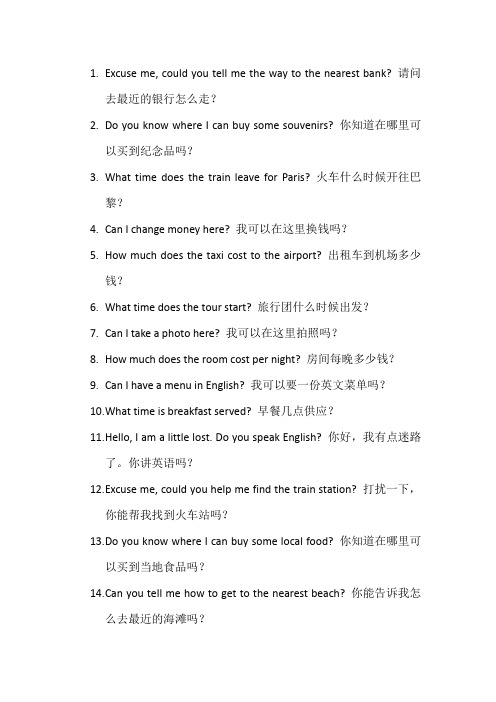
1.Excuse me, could you tell me the way to the nearest bank? 请问去最近的银行怎么走?2.Do you know where I can buy some souvenirs? 你知道在哪里可以买到纪念品吗?3.What time does the train leave for Paris? 火车什么时候开往巴黎?4.Can I change money here? 我可以在这里换钱吗?5.How much does the taxi cost to the airport? 出租车到机场多少钱?6.What time does the tour start? 旅行团什么时候出发?7.Can I take a photo here? 我可以在这里拍照吗?8.How much does the room cost per night? 房间每晚多少钱?9.Can I have a menu in English? 我可以要一份英文菜单吗?10.W hat time is breakfast served? 早餐几点供应?11.H ello, I am a little lost. Do you speak English? 你好,我有点迷路了。
你讲英语吗?12.E xcuse me, could you help me find the train station? 打扰一下,你能帮我找到火车站吗?13.D o you know where I can buy some local food? 你知道在哪里可以买到当地食品吗?14.C an you tell me how to get to the nearest beach? 你能告诉我怎么去最近的海滩吗?15.I am looking for a good place to stay. Do you have any suggestions?我在找一个好的住宿地方。
出国旅游常用实用英语大全

出国旅游常用实用英语大全假设你选择的是国外航空公司,同时该公司没有中文服务人员。
这时候该怎么办呢?快点储备一些出国旅游实用句型吧~1. 托运行李- 递给对方护照和机票,对方可能会问:How many luggages are you checking in? (有多少件托运行李?)Do you have a carry on? (有手提行李没?)Can you place your baggage up here? (请把行李放上来(传送带/小盒子))- 出票前可能会问:Do you prefer window or aisle? (想靠窗还是靠走廊)如果对方不问你,但是你想找个靠窗座位,能够说Can I have a seat closest to the window?- 最后,对方给你登机牌,会告诉你登机门号和时间:Here are your tickets. The gate number is on the bottom ofthe ticket.They will start boarding 20 minutes before the departure time. You should report to gate C2 by then.C2 is around the corner and down the hall. Thank you."* 如果你行李超重,对方会说 your luggage is overweight. 以上问题回答都是yes, no的就不写了2. 飞行过程中的英语- 其实没什么好说的,无非是让你选餐时,你选chicken还是beef 此类的.....你就说Chicken please 一切OK. 如果想要东西时,句型很简单,就是Excuse me, Could I have a cup of orange juice, please 这种.* 如果冷想多要一个毯子能够说 Could I get another blanket, please, I'm a little cold.* 如果要在飞机上填入境表,没有笔能够说:Could you lend me a pen to fill out this immigration form?* 如果要找个人换座,能够说:Would it be possible to change seats with someone?* 如果有人坐在你椅子上了,能够说: I'm sorry, I think you are in my seat.* 机场广播一般.....不用听懂.....空乘可能会提醒你的就是:Please fasten your seat belt (请系紧安全带)这类。
出国旅游常用英语口语
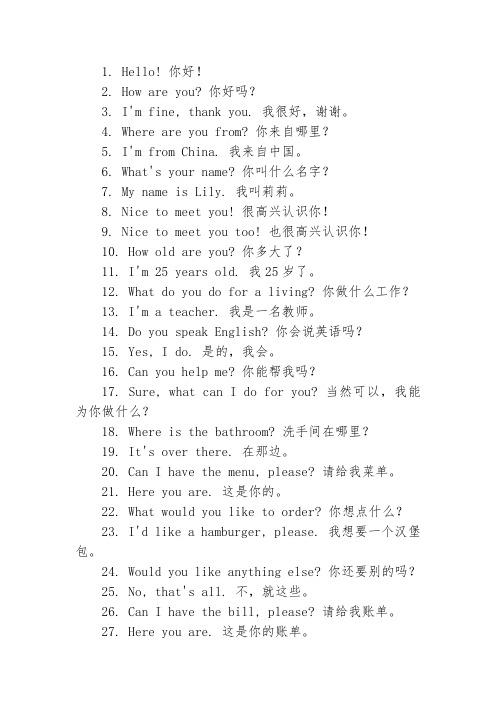
1. Hello! 你好!2. How are you? 你好吗?3. I'm fine, thank you. 我很好,谢谢。
4. Where are you from? 你来自哪里?5. I'm from China. 我来自中国。
6. What's your name? 你叫什么名字?7. My name is Lily. 我叫莉莉。
8. Nice to meet you! 很高兴认识你!9. Nice to meet you too! 也很高兴认识你!10. How old are you? 你多大了?11. I'm 25 years old. 我25岁了。
12. What do you do for a living? 你做什么工作?13. I'm a teacher. 我是一名教师。
14. Do you speak English? 你会说英语吗?15. Yes, I do. 是的,我会。
16. Can you help me? 你能帮我吗?17. Sure, what can I do for you? 当然可以,我能为你做什么?18. Where is the bathroom? 洗手间在哪里?19. It's over there. 在那边。
20. Can I have the menu, please? 请给我菜单。
21. Here you are. 这是你的。
22. What would you like to order? 你想点什么?23. I'd like a hamburger, please. 我想要一个汉堡包。
24. Would you like anything else? 你还要别的吗?25. No, that's all. 不,就这些。
26. Can I have the bill, please? 请给我账单。
出国旅游常用英语大全
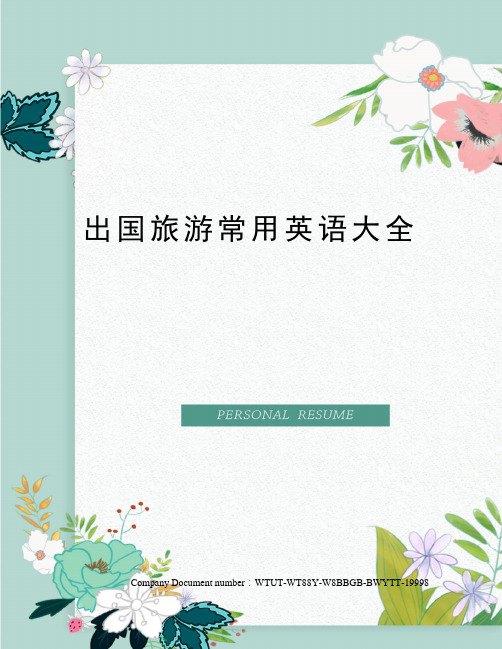
出国旅游常用英语大全 Company Document number:WTUT-WT88Y-W8BBGB-BWYTT-19998出国旅游常用英语大全May I see your passport, please麻烦请给我你的护照。
Where are you staying将在那儿住宿Here is my passport / Here it is.这是我的护照。
I will stay at Boston Hotel.我将住在波士顿饭店。
What's the purpose of your visit旅行的目的为何Do you have a return ticket to Taiwan是否有台湾回程机票Sightseeing(Businese).观光(公务)。
Yes, here it is.有的,这就是回程机票。
How long will you be staying in the United States 预计在美国停留多久I plan to stay for about 10 days.预计停留约10天。
How much money do you have with you你随身携带多少现金I have 800 dollars.大约800元。
Good. Have a nice day.祝你玩得愉快。
I'm just passing through.我只是过境而已。
Thank you.谢谢。
I am leaving for Geneva tonight.今晚即动身前往日内瓦。
Where can I get my baggage我在何处可取得行李It's a small ovemight bag. It's light brown.它是一个茶色小旅行袋。
I can'find my baggage.我找不到我的行李。
Please wait for a moment while we are investigating.我们正在调查,请稍等一下。
出国旅游实用英语
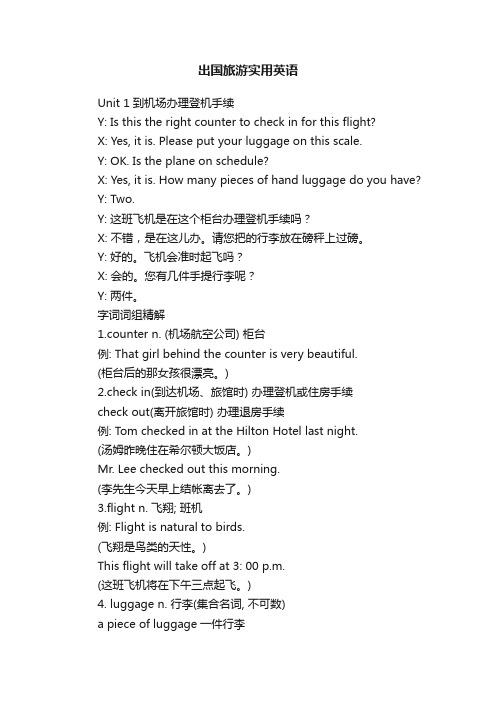
出国旅游实用英语Unit 1到机场办理登机手续Y: Is this the right counter to check in for this flight?X: Yes, it is. Please put your luggage on this scale.Y: OK. Is the plane on schedule?X: Yes, it is. How many pieces of hand luggage do you have? Y: Two.Y: 这班飞机是在这个柜台办理登机手续吗?X: 不错,是在这儿办。
请您把的行李放在磅秤上过磅。
Y: 好的。
飞机会准时起飞吗?X: 会的。
您有几件手提行李呢?Y: 两件。
字词词组精解1.counter n. (机场航空公司) 柜台例: That girl behind the counter is very beautiful.(柜台后的那女孩很漂亮。
)2.check in(到达机场、旅馆时) 办理登机或住房手续check out(离开旅馆时) 办理退房手续例: Tom checked in at the Hilton Hotel last night.(汤姆昨晚住在希尔顿大饭店。
)Mr. Lee checked out this morning.(李先生今天早上结帐离去了。
)3.flight n. 飞翔; 班机例: Flight is natural to birds.(飞翔是鸟类的天性。
)This flight will take off at 3: 00 p.m.(这班飞机将在下午三点起飞。
)4. luggage n. 行李(集合名词, 不可数)a piece of luggage一件行李two pieces of luggage二件行李注意:1)baggagen. 行李(亦为集合用法, 不可数, 主要用于英国)three pieces of baggage三件行李2)凡表集合用法的名词, 均不可在其后加"s"形成复数型, 而应以"a piece of..."或"two pieces of..."表之。
出国旅游实用英语

出国旅游实用英语
1.我需要一张经济舱/头等舱的机票。
I'll need an economy/a first-class ticket
2.我想预订10月2日飞往美国的航班。
I'd like to reserve a flight to America for the second of October.
2.我想搭直飞的航班。
I want to take a direct flight.
3.我想要靠窗座位/靠过道的座位。
I'd like a window seat/ an aisle seat.
5我要坐在飞机前部。
I'd like to sit in the front of the plane
6.我要再确认一下我从伦敦到东京的班机。
I'd like to reconfirm my flight from London to Tokyo.
7.我要退这张票。
I'd like a refund on this ticket.
8.去纽约的经济舱机票多少钱?What's the fare to New York, Economy Class?
9.我想把这张票换成头等车。
I'd like to change this ticket to the first class.
10.请给我一张去芝加哥的单程二等票好吗?Can I have a second-class one way ticket to Chicago, please?。
实用出国旅游常用英语口语大全
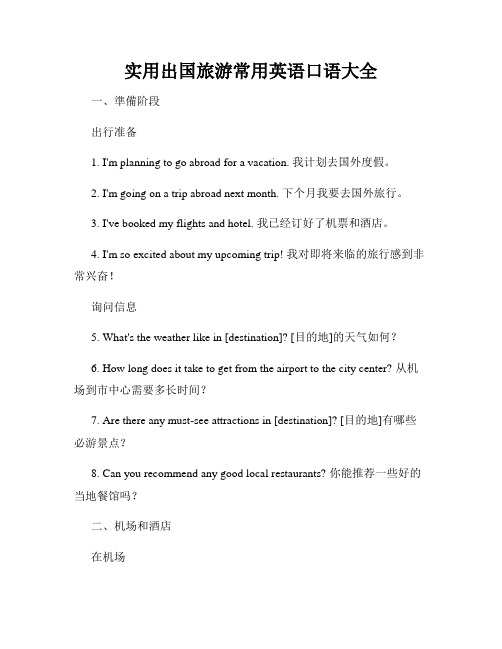
实用出国旅游常用英语口语大全一、準備阶段出行准备1. I'm planning to go abroad for a vacation. 我计划去国外度假。
2. I'm going on a trip abroad next month. 下个月我要去国外旅行。
3. I've booked my flights and hotel. 我已经订好了机票和酒店。
4. I'm so excited about my upcoming trip! 我对即将来临的旅行感到非常兴奋!询问信息5. What's the weather like in [destination]? [目的地]的天气如何?6. How long does it take to get from the airport to the city center? 从机场到市中心需要多长时间?7. Are there any must-see attractions in [destination]? [目的地]有哪些必游景点?8. Can you recommend any good local restaurants? 你能推荐一些好的当地餐馆吗?二、机场和酒店在机场1. Excuse me. Where is the baggage claim area?打扰一下,请问行李领取区在哪里?2. Could you please direct me to the customs?请问通关在哪里?3. Is there a shuttle bus to the city center?有通往市中心的班车吗?4. How much is a taxi to downtown?去市区坐出租车要多少钱?在酒店5. I have a reservation under the name of [name].我预订了一个房间,名字是[name]。
出国旅游常用英语大全完整版

出国旅游常用英语大全 HUA system office room 【HUA16H-TTMS2A-HUAS8Q8-HUAH1688】出国旅游常用英语大全? May I see your passport, please麻烦请给我你的护照。
Where are you staying?将在那儿住宿?Here is my passport / Here it is.这是我的护照。
I will stay at Boston Hotel.我将住在波士顿饭店。
What's the purpose of your visit旅行的目的为何?Do you have a return ticket to Taiwan?是否有台湾回程机票?Sightseeing(Businese).观光(公务)。
Yes, here it is.有的,这就是回程机票。
How long will you be staying in the United States预计在美国停留多久?I plan to stay for about 10 days.预计停留约10天。
How much money do you have with you你随身携带多少现金?I have 800 dollars.大约800元。
Good. Have a nice day.祝你玩得愉快。
I'm just passing through.我只是过境而已。
Thank you.谢谢。
I am leaving for Geneva tonight.今晚即动身前往日内瓦。
Where can I get my baggage我在何处可取得行李?It's a small ovemight bag. It's light brown.它是一个茶色小旅行袋。
I can'find my baggage.我找不到我的行李。
Please wait for a moment while we are investigating.我们正在调查,请稍等一下。
出国旅游实用英语口语大全
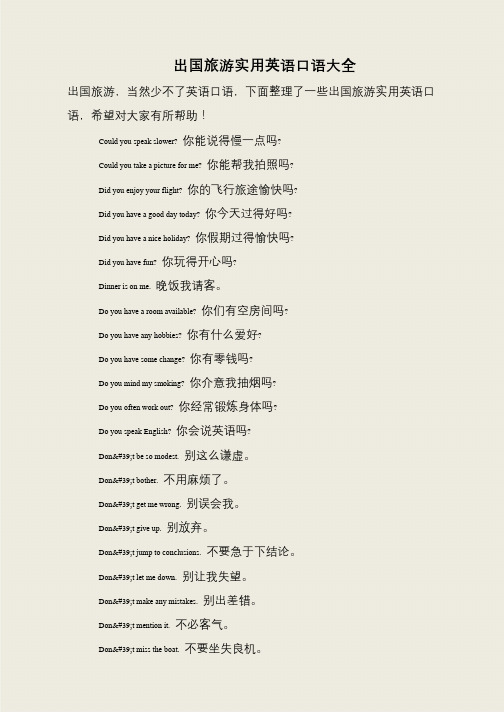
出国旅游实用英语口语大全出国旅游,当然少不了英语口语,下面整理了一些出国旅游实用英语口语,希望对大家有所帮助!Could you speak slower? 你能说得慢一点吗?Could you take a picture for me? 你能帮我拍照吗?Did you enjoy your flight? 你的飞行旅途愉快吗?Did you have a good day today? 你今天过得好吗?Did you have a nice holiday? 你假期过得愉快吗?Did you have fun? 你玩得开心吗?Dinner is on me. 晚饭我请客。
Do you have a room available? 你们有空房间吗?Do you have any hobbies? 你有什么爱好?Do you have some change? 你有零钱吗?Do you mind my smoking? 你介意我抽烟吗?Do you often work out? 你经常锻炼身体吗?Do you speak English? 你会说英语吗?Don't be so modest. 别这么谦虚。
Don't bother. 不用麻烦了。
Don't get me wrong. 别误会我。
Don't give up. 别放弃。
Don't jump to conclusions. 不要急于下结论。
Don't let me down. 别让我失望。
Don't make any mistakes. 别出差错。
Don't mention it. 不必客气。
Don't miss the boat. 不要坐失良机。
- 1、下载文档前请自行甄别文档内容的完整性,平台不提供额外的编辑、内容补充、找答案等附加服务。
- 2、"仅部分预览"的文档,不可在线预览部分如存在完整性等问题,可反馈申请退款(可完整预览的文档不适用该条件!)。
- 3、如文档侵犯您的权益,请联系客服反馈,我们会尽快为您处理(人工客服工作时间:9:00-18:30)。
Unit 1到机场办理登机手续Y: Is this the right counter to check in for this flight?X: Yes, it is. Please put your luggage on this scale.Y: OK. Is the plane on schedule?X: Yes, it is. How many pieces of hand luggage do you have?Y: Two.Y: 这班飞机是在这个柜台办理登机手续吗?X: 不错,是在这儿办。
请您把的行李放在磅秤上过磅。
Y: 好的。
飞机会准时起飞吗?X: 会的。
您有几件手提行李呢?Y: 两件。
字词词组精解1.counter n. (机场航空公司) 柜台例: That girl behind the counter is very beautiful.(柜台后的那女孩很漂亮。
)2.check in(到达机场、旅馆时) 办理登机或住房手续check out(离开旅馆时) 办理退房手续例: Tom checked in at the Hilton Hotel last night.(汤姆昨晚住在希尔顿大饭店。
)Mr. Lee checked out this morning.(李先生今天早上结帐离去了。
)3.flight n. 飞翔; 班机例: Flight is natural to birds.(飞翔是鸟类的天性。
)This flight will take off at 3: 00 p.m.(这班飞机将在下午三点起飞。
)4. luggage n. 行李(集合名词, 不可数)a piece of luggage一件行李two pieces of luggage二件行李注意:1)baggagen. 行李(亦为集合用法, 不可数, 主要用于英国)three pieces of baggage三件行李2)凡表集合用法的名词, 均不可在其后加"s"形成复数型, 而应以"a piece of..."或"two pieces of..."表之。
常用到的有一张纸(a piece of paper)、一片面包(a piece of bread)、一件家俱(a piece of furniture)、一件垃圾(a piece of garbage) 等。
5.scale n. 磅秤6.schedule n. 时间表, 计画, 预定on schedule按照预定, 按照时间(表)behind schedule比预定落后, 误点ahead of schedule超前, 比预定提前例: The flight arrived on schedule.(那班飞机准时抵达。
)The train is an hour behind schedule.(火车误点一个小时。
)The job was finished ahead of schedule.(那工作提前完成了。
)7. hand luggage手提行李(可随身携带上飞机, 不须过磅秤)句型运用1.please表『请……』, 使用时之后接原形动词, 但也可置于句尾, 此时之前要有逗点。
例: Please open the door.(请开门。
)Would you please open the window?(请开窗好吗?)Come in, please.(请进。
)*至此各位脑袋会不会痛啊?不会的话, 再告诉你please也可当动词用, 表『使人高兴、快乐』之意。
例: Mary is easy to please.=It is easy to please Mary.(玛丽易于取悦。
)I sang a song to please my girlfriend Lisa.(我唱一首歌以取悦女友丽莎。
)2. How many + 可数名词+...?有多少……呢?=How much + 不可数名词+...?例: How many pens do you have?(你有多少枝笔呢?)How much money do you have?(你有多少钱呢?)Unit 2 在航空公司柜台询问座位X: Do you have any seat preferences, sir?Y: Yes, could you put me in the no-smoking section?X: Yes. Would you like a window seat?Y: If one's available, please. But not over the wing.X: 先生,您对座位有什么偏爱吗?Y: 有的,请把我安排在非抽烟区好吗?X: 没问题。
请问您喜欢靠窗的位子吗?Y: 如果还有空的话最好。
但不要是在靠机翼的窗边。
字词词组精解1.seat n. 座位, 位子例: Is this seat taken?(这位子有人坐吗?)注意:a.seat也可当及物动词, 意为『使有位子坐』。
例: He seated himself in the corner.=He was seated in the corner.=He sat in the corner.(他坐在角落。
)*可千万不要说成:He seated in the corner. ()b.sit vi. 坐, 就座例: Please sit down.(请就座。
)2.preference n. 偏好, 较喜欢a.本字是由及物动词prefer在字尾接-ence而成的名词, 表『偏爱』的意思, 其重要词组如下:have a preference for喜爱, 偏好例: Peter has a preference for reading short stories.(彼得喜爱看短篇小说。
)b.本字的原型动词prefer (vt.) 表『宁要』、『比较喜欢』, 是极重要的单字, 请诸位注意下列用法的区别。
1)prefer to + 原形动词+ rather than + 原形动词=prefer to + 原形动词+ instead of + 动名词例: I prefer to die rather than do it.=I prefer to die instead of doing it.(我宁死也不愿做那件事。
)2)prefer + 动名词+ to + 动名词名词名词*在这儿, to是介系词, 表『针对』的意思。
例: I prefer movies to music.(我喜爱电影甚于音乐。
)I prefer going to the movies to watching TV.(与其看电视我宁愿去看电影。
)c.preferable a. 较好的, 较受欢迎的*该字常用在"A is preferable to B"的句构中, to在这儿是介系词, 表『针对』的涵意, 整个词组的意思是『针对B而言A较受欢迎』。
例: Mr. Lee is preferable to Mr. Wang.(李先生比王先生较受欢迎。
)3.no-smoking section非吸烟区*在飞机、车船或戏院里, 常有禁烟区, 以维环境品质的优雅。
例: The no-smoking section is on the right side.(非吸烟区在右边。
)4.section n. 部分, 部门, 区域例: There are three sections in Lesson One.(第一课有三部份。
)5.If one's available, please.a.本句是说,『如果还有靠窗位子的话, 请划位给我。
』的意思, 即等于"If a window seat is available, please."b.available a. 有空的; 出售的例: Are you available this evening?(你今晚有空吗?)Do you have the September issue of Ivy League AnalyticalEnglish available here? (你这里有卖九月份的《常春藤解析英语杂志》吗?)Unit 3 准备登机Y: We'd better hurry. They're boarding already.X: OK. Let's go. But which way is Gate 20?Y: Oh, here comes a man. Let's ask him...Excuse me. Can you direct me to Gate 20, please?Z: Sure. Go down the stairs right over there and you'll see some directions. Just follow them.Y: 我们最好快一点,大家已在登机了。
X: 好,那就走吧。
但二十号登机门是在哪儿呢?Y: 哦,前面来了一个人,我们问问他吧。
……对不起,请问二十号登机门怎么走?Z: 当然。
顺着那边的楼梯下去,你就会看到一些指示。
照着指示走就到了。
字词词组精解1.hurry vi. 赶快a.这个字老外习惯在后面加上一个副词"up", 形成词组:hurry up赶快, 快一点例: Hurry up, or you will not catch the train.(快点,否则你会赶不上火车。
)b.hurry也常在后面接另一个副词through, 然后再接受词, 形成下列词组:hurry through...匆忙赶完……例: James hurried through his work in one hour.(詹姆士在一小时内匆忙赶完工作。
)c.hurry亦可当名词使用, 表『匆促』、『急忙』。
例: We still have plenty of time. What's the hurry?(我们仍有很多时间,干嘛那么急呢?)d.常用的一个重要词组:in a hurry匆忙地, 急匆匆地=in a rush例: James was in a hurry to meet his girlfriend.=James was in a rush to meet his girlfriend.(詹姆士急着去见他的女友。
)2.board [ b rd ] vi. & vt. 登上(飞机、车船等)*文中本句的主词they是泛指『旅客们』(passengers) 在本句里, board为不及物动词, 不过此字亦常以及物动词使用。
